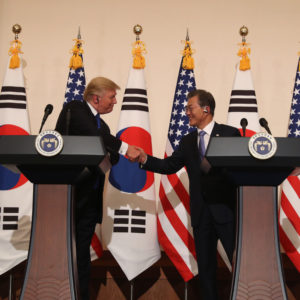WASHINGTON — Here’s a view going around here about why President Donald Trump is demanding huge sums from both Japan and South Korea for the privilege of having U.S. bases and forces on their soil.
Trump, according to this theory, is looking for a pretext to drastically reduce if not withdraw U.S. forces from both these U.S. allies. If he keeps asking for much more than either is going to give, then maybe he’ll have a perfect excuse for pulling out U.S. troops.
That theory may come as a shock to those who say Trump is not such an idiot as to want to jeopardize the carefully wrought U.S. alliance structure in the region, is he? The answer is, if he’s not certifiably the “dotard” as North Korea described him before the era of those useless summits with Kim Jong-un in Singapore and Hanoi, he might still be thinking, if South Korea and Japan aren’t going to give a whole lot more money, then I will show I mean business by withdrawing U.S. forces.
Seriously, we may be in for quite a shock. Trump may threaten to slash U.S. strength in South Korea, already down to 28,500 troops, by another 50 percent just as the central elements of U.S. Forces Korea are settling in to Camp Humphreys, the mega-base south of Seoul. Yes, he may do the same in Japan, where the U.S. has about 50,000 troops, including a marine division in Okinawa. Strategic U.S. Air Force elements are also based in South Korea, mostly at Osan, and in Japan at Kadena on Okinawa, the largest U.S. air base in the region.
If nothing else, Trump’s demands mean U.S. military power in Northeast Asia cannot be taken for granted. Trump has already made terrific concessions to North Korea, canceling military exercises, and he’s said he sees no reason why so many U.S. troops are needed in either South Korea or Japan. In a sense he’s going along with South Korea’s President Moon Jae-in, who seems inclined to do whatever’s needed to appease Kim Jong-un. Moon may not want U.S. troops to leave precipitously while North Korea refuses to make significant concessions but will stand fast against raising the South Korean share of annual expenses for U.S. forces by an outlandish $5 billion as demanded by the U.S.
Trump is encountering problems of a somewhat different sort with the Japanese. Japan’s conservative Prime Minister Shinzo Abe may not bow before the U.S. proposal for a $4 billion rise in the annual Japanese outlay but, unlike Moon, does not fantasize reconciliation with North Korea. If there’s one country that Japan might want to attack, after shaking off Article 9 of the post-war constitution forbidding Japanese forces from waging war overseas, it’s North Korea. That figures since Kim has rather rudely rejected a summit with Abe while testing short-range missiles that are long-range enough to hit bases in Japan.
Trump showed his lack of passion about Japan as an ally by condoning North Korean missile tests that obviously were upsetting to the Japanese. “It’s terrible that Trump let these missiles tests go by,” Joseph Yun, former U.S. negotiator with North Korea, said at a session of the Sejong Society here. “It’s truly upsetting to an ally.” Trump, he said, “completely ignores” Japanese fears.
Trump’s refusal to speak out about North Korean missiles suggests yet another theory that’s almost as appalling as his search for a pretext for withdrawal of U.S. forces. That is that Trump “completely does not care,” said Yun, that Japan and South Korea are at bitter odds on issues going back to Japanese colonial rule and exploitation of Korean comfort women and slave labor in World War II.
All of which means Trump is not concerned about the end of the General Security of Military Information Agreement (GSOMIA) under which Japan and Korea were exchanging vital military intelligence. Moon’s decision to cancel GSOMIA was “deeply frustrating,” Kelly Magsamen, who worked on the deal as deputy assistant secretary of defense at the Pentagon, said at the Sejong gathering. Rather than the U.S. having to relay intel from one to the other, “We could share information at the point of attack.”
So how does Trump feel about the ruckus between Japan and South Korea? He “kind of enjoys seeing two allies fighting one another,” said Yun, just as he’d be fine with the end of the U.S. commitment to defense of both of them.

